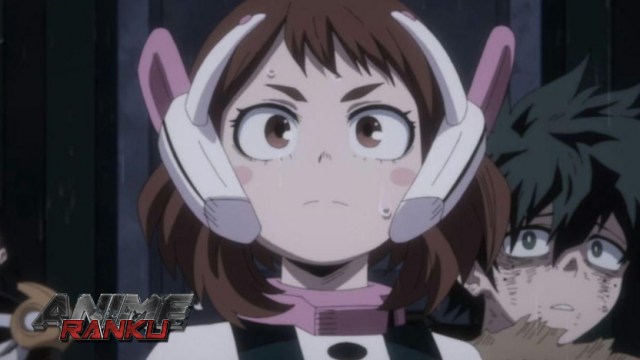Anime is well known for its most powerful and influential heroes, known as shonen. While these icons’ strength, resilience, and inspiration are admirable, there is an issue with the recurring “Solo Savior” trope that appears in shonen titles. My Hero Academia takes a different approach with its protagonist, Izuku Midoriya, also known as Deku.
After attempting to track down the antagonistic All For One on his own, Deku is persuaded to seek assistance from his friends and return to the safety of U.A. High School. Deku is already hesitant to accept a place to rest when he is met by a hostile mob of civilians who refuse to let him stay. Typically, this is the point at which the protagonist knows exactly what to say to inspire everyone and lead them to peace. Instead, that role is played by Ochaco Uraraka, whose words save the day more than any “Solo Savior” before her.
The Solo Savior Trope in Shonen Anime Explained

While it is necessary to have a story with a central main character, anime has a tendency to rely on the idea that the protagonist will always save the day. While the “Solo Savior” trope has helped to build some of the most iconic characters (such as Naruto Uzumaki, Goku, and Ash Ketchum), it has been used for far too long and has its own set of issues.
When it is always up to the lead character to make a difference, the potential of other side characters is diminished. With only one character who is truly growing and acting, the story and lore can become limited. It also conveys the message that only a “chosen one” can be the true hero, which is unrealistic given that no real person is that perfect. My Hero Academia took a different path in the latter half of Season 6, deviating from the formula.
My Hero Academia Modifies the Shonen Narrative

Despite his efforts to be a solo Savior, Deku’s actions are ineffective in resolving all of the problems that surround him. Two issues emerge after his classmates persuade him to return to U.A. and face angry civilians. The first is the obvious fact that Deku requires a place to rest and prepare for the battle ahead; the second is that society remains in shambles as a result of civilians’ distrust of Pro Heroes.
Both issues must be addressed in order to truly resolve any conflict, including the upcoming battle against All For One. Although he is the protagonist and, like his predecessors, is meant to be a symbol of hope, it is clear in this scene that Deku cannot make a difference.
The main impediment to peace is the civilians’ twisted hearts, and it is the side character Ochaco Uraraka who saves the day. Her speech persuades the audience to see Deku, and all heroes for that matter, as human beings in need of a reprieve. The fact that Deku is not just a hero, but also a high school student with a heavy burden to bear, causes civilians to view heroes differently. This results in Deku’s moment of rest and healing before the final confrontation, and it also begins to heal society. These are things Deku could never have done.
The Influence of Ochaco’s Words in a Crucial MHA Moment

Although the rumors of Deku’s lone heroism were met with some positive feedback, the mystery of his powers and his grim appearance made plenty of people feel uneasy. Along with his worn-down mental state, there was no way he could have bridged the gap between himself and the civilians. This in turn would’ve left him without a place of rest and at greater risk of dying at All For One’s hands.
Ochaco’s resolution demonstrates that no single hero has the answer to every problem. Even though Deku tries to solve problems on his own, his friend’s speech demonstrates that hard work can be distributed across heroes rather than relying on a single Solo Savior. The image of civilians working alongside heroes contrasts with how My Hero Academia began, with civilians standing on the sidelines and not participating in the hard work.
Ochaco gives the people a call to action and a sense of power by focusing on civilians and revealing how they can support heroes. One bystander points out the flaw in putting heroes on a pedestal and simply watching from afar. They aren’t convinced to join the fight, but Ochaco’s words inspire them to realize they are capable of far more than they previously imagined. Moving forward, if civilians remember to support Pro Heroes and carefully act as good samaritans, they can collectively return to a more peaceful society rather than relying on a single chosen hero.















Leave a Reply